#cloud in manufacturing industry
Explore tagged Tumblr posts
Text

Tired of paper piles? 🚫 Go paperless with Magtec ERP Software! 💻 Streamline your workflow and boost efficiency. It's time to embrace the digital future.
#erp#business#software#management#automation#enterprise#resources#planning#solution#system#cloud#industry#finance#accounting#supplychain#inventory#crm#hr#manufacturing#distribution#retail#healthcare#education#hospitality#smallbusiness#mediumenterprise#largeenterprise#magtecerp#magtec#magtecsolutions
3 notes
·
View notes
Text
ERP software for manufacturing industry | shantitechnology
Enhance your manufacturing business with STERP (shantitechnology), the best ERP software provider in India. Our ERP for manufacturing companies in Gujarat is specifically designed to streamline operations and boost efficiency. Whether you are in Rajkot or any other part of Gujarat, our ERP software for manufacturing industry solutions ensure your business stays ahead of the competition. As one of the top ERP software providers in India, STERP delivers cutting-edge technology and unmatched support.
Transform your business with STERP today and experience the future of enterprise resource planning!
#ERP for manufacturing company in Gujarat#Best ERP software provider in India#ERP for manufacturing company in Rajkot#ERP software for manufacturing industry#ERP software providers in India#India#Gujarat#Vadodara#Rajkot#Surat#ERP solution#cloud ERP
4 notes
·
View notes
Text
ERP Trends 2024: What Engineering and Manufacturing Industries Need to Know
As we navigate through 2024, the landscape of Enterprise Resource Planning (ERP) systems continues to evolve, presenting both opportunities and challenges for engineering and manufacturing industries. Companies in this sector, especially those in key industrial regions like Maharashtra, Mumbai, Pune, and Gujarat, must stay abreast of the latest ERP trends to maintain competitive advantage and operational efficiency. In this blog, we’ll delve into the significant ERP trends of 2024 and their implications for the engineering and manufacturing sectors.
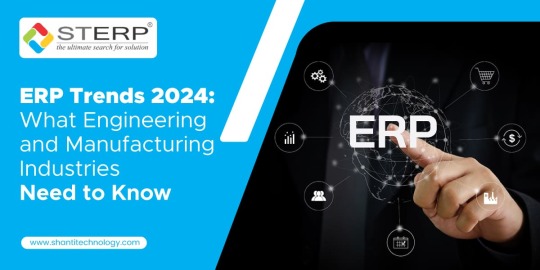
1. Increased Adoption of Cloud-Based ERP Solutions
One of the most significant trends in ERP software for engineering companies in Maharashtra and across India is the shift towards cloud-based solutions. Cloud ERP offers several advantages over traditional on-premise systems, including lower upfront costs, greater scalability, and enhanced accessibility.
Benefits of Cloud-Based ERP:
Cost Efficiency: Eliminates the need for expensive hardware and reduces IT maintenance costs.
Scalability: Easily adjusts to the growing needs of a manufacturing company in Gujarat or an engineering firm in Mumbai.
Accessibility: Provides access to real-time data from anywhere, facilitating better decision-making.
Leading ERP software companies in Pune are increasingly offering cloud-based solutions tailored to the needs of local engineering and manufacturing businesses. These solutions support remote work and ensure business continuity in an increasingly digital world.
2. Integration of AI and Machine Learning
Artificial Intelligence (AI) and Machine Learning (ML) are revolutionizing ERP systems by providing intelligent insights and automating routine tasks. For ERP software for engineering companies in Mumbai, integrating AI can enhance predictive maintenance, optimize supply chain management, and improve production planning.
AI and ML Applications in ERP:
Predictive Analytics: Helps foresee equipment failures and reduce downtime.
Supply Chain Optimization: Enhances demand forecasting and inventory management.
Process Automation: Automates repetitive tasks, freeing up human resources for more strategic roles.
ERP solution providers in Pune are at the forefront of integrating AI and ML into their systems, enabling companies to leverage advanced analytics and improve overall operational efficiency.
3. Emphasis on Cybersecurity
With the increasing digitization of manufacturing processes, cybersecurity has become a critical concern. ERP systems, being the backbone of business operations, are prime targets for cyber-attacks. Engineering and manufacturing companies in regions like Gujarat and Maharashtra need robust cybersecurity measures to protect their sensitive data.
Key Cybersecurity Features:
Data Encryption: Protects data during transmission and storage.
Multi-Factor Authentication: Enhances user authentication processes.
Regular Security Audits: Ensures continuous monitoring and improvement of security protocols.
ERP software for engineering companies in Maharashtra must incorporate these advanced security features to safeguard against data breaches and cyber threats.
4. Enhanced User Experience (UX)
User experience has become a critical factor in ERP adoption and utilization. Modern ERP systems are focusing on intuitive interfaces and user-friendly designs to ensure that all employees, regardless of their technical expertise, can effectively use the system.
UX Improvements:
Intuitive Dashboards: Provide real-time insights and easy navigation.
Mobile Accessibility: Ensures that users can access ERP data on-the-go.
Customization Options: Allow users to tailor the system to their specific needs.
ERP software companies in Pune are prioritizing user experience in their solutions, making it easier for engineering and manufacturing firms to train their staff and increase productivity.
5. Internet of Things (IoT) Integration
The integration of IoT with ERP systems is another trend transforming the manufacturing industry. IoT devices collect vast amounts of data from production lines, equipment, and other operational areas, which can be analyzed by the ERP system to optimize performance.
IoT Benefits in ERP:
Real-Time Monitoring: Provides immediate insights into production processes.
Predictive Maintenance: Schedules maintenance activities based on equipment condition rather than time intervals.
Enhanced Quality Control: Monitors product quality throughout the manufacturing process.
For ERP for manufacturing companies in Gujarat, IoT integration offers a significant advantage by improving efficiency and reducing operational costs.
6. Sustainability and Green Manufacturing
Sustainability is becoming a critical focus for manufacturing companies worldwide. ERP systems are evolving to support green manufacturing practices by tracking and optimizing resource usage, reducing waste, and ensuring compliance with environmental regulations.
Sustainable ERP Features:
Resource Management: Tracks energy and material usage to minimize waste.
Regulatory Compliance: Ensures adherence to environmental laws and standards.
Sustainability Reporting: Provides detailed reports on sustainability metrics.
Engineering and manufacturing companies in regions like Mumbai and Maharashtra can benefit from ERP solutions that incorporate sustainability features, helping them achieve their environmental goals and enhance their corporate reputation.
7. Modular and Flexible ERP Solutions
In response to the diverse needs of engineering and manufacturing firms, ERP solution providers in Pune are developing more modular and flexible ERP systems. These systems allow companies to select and implement only the modules they need, which can be easily scaled and customized as their business grows.
Advantages of Modular ERP:
Cost-Effective: Pay only for the features you need.
Scalability: Easily add new modules as your business requirements evolve.
Customization: Tailor the system to fit specific operational needs.
This trend is particularly beneficial for small to medium-sized enterprises (SMEs) in the engineering and manufacturing sectors, enabling them to adopt ERP systems without the burden of high costs or complexity.
8. Focus on Customer-Centric Manufacturing
ERP systems are increasingly supporting customer-centric manufacturing practices, where production processes are aligned with customer needs and preferences. This approach enhances customer satisfaction and drives business growth.
Customer-Centric ERP Features:
Custom Order Management: Handles unique customer requirements and specifications.
Enhanced CRM Integration: Integrates with customer relationship management (CRM) systems for a holistic view of customer interactions.
Real-Time Order Tracking: Provides customers with real-time updates on their orders.
Manufacturing companies in Gujarat and engineering firms in Maharashtra are leveraging these customer-centric ERP features to improve their service levels and build stronger customer relationships.
9. Advanced Analytics and Business Intelligence (BI)
Advanced analytics and BI are becoming integral components of modern ERP systems. These tools provide deep insights into business operations, helping companies make data-driven decisions and improve performance.
Key BI Features:
Data Visualization: Converts complex data into easy-to-understand charts and graphs.
Dashboards: Offer a real-time overview of key performance indicators (KPIs).
Predictive Analytics: Forecasts future trends based on historical data.
ERP software companies in Pune are incorporating advanced analytics and BI capabilities into their systems, empowering engineering and manufacturing firms to gain a competitive edge through better insights and informed decision-making.
10. Globalization and Localization Support
As engineering and manufacturing companies expand their operations globally, ERP systems must support multiple languages, currencies, and regulatory requirements. Globalization and localization features are essential for companies operating in diverse markets.
Globalization Features:
Multi-Language Support: Accommodates users from different regions.
Multi-Currency Handling: Manages transactions in various currencies.
Compliance with Local Regulations: Ensures adherence to regional laws and standards.
ERP solution providers in Pune and other industrial hubs are enhancing their systems to support global operations, enabling companies to seamlessly manage their international business processes.
Conclusion
The ERP landscape for engineering and manufacturing industries is rapidly evolving, driven by advancements in technology and changing business needs. Companies in Maharashtra, Mumbai, Pune, and Gujarat must stay informed about these trends to leverage the full potential of ERP systems. By adopting cloud-based solutions, integrating AI and IoT, prioritizing cybersecurity, and focusing on sustainability, businesses can achieve greater efficiency, competitiveness, and growth in 2024 and beyond.
For engineering and manufacturing firms looking for the best ERP software for engineering companies in Maharashtra or ERP for manufacturing companies in Gujarat, it is crucial to partner with leading ERP solution providers in Pune who understand the unique challenges and opportunities in this sector. Embracing these trends will not only enhance operational efficiency but also drive innovation and sustainability in the engineering and manufacturing industries.
By staying ahead of these ERP trends, companies can position themselves for success in an increasingly digital and interconnected world. Whether you are an engineering firm in Mumbai or a manufacturing company in Gujarat, the right ERP system can transform your operations and pave the way for a prosperous future.
#ERP software in Vadodara#Manufacturing ERP software in Gujarat#ERP software companies in Vadodara#ERP software providers in Vadodara#ERP for manufacturing company in Gujarat#ERP software#ERP system#cloud ERP#ERP solutions#software development#engineering ERP#management software#engineering services#engineering industry
5 notes
·
View notes
Text
ERP Software for Meat Processors: A Comprehensive Guide for UK Manufacturer
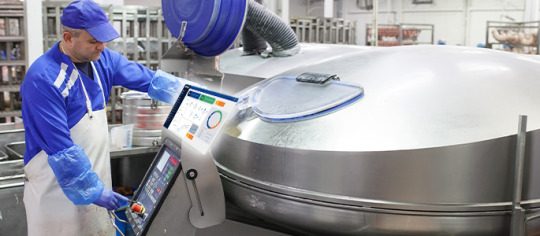
Meat manufacturing is one of the most complex industries in the food sector not just in the United Kingdom (UK) but globally. If meat is not handled properly, there is a higher risk of infection and diseases – making this industry one of the most sensitive and challenging segments amongst the other food verticals.
Also, there are hiccups related to catch weight calculations, poultry management (in terms of feeding, hygiene, and wellness), perishability, and the complexities of assigning grades and cuts to meat products. Adding more are the health issues related to meat consumption, that often stem from the living conditions of the animals, and any negligence in the supply chain or storage can lead to contamination.
This poses serious risks to consumer health and often raises red flags among regulators. Consequently, meat manufacturers are under constant pressure to comply with industry standards, while navigating intensifying competition, shrinking profit margins, delivering high-quality products, and managing the entire supply chain. Not to forget, today's consumers are increasingly health-conscious and demand products that meet strict nutritional and safety standards. This puts additional pressure on manufacturers, who not only have to meet these expectations but also face the challenge of accurately conveying all the necessary information on labels and packaging. But wait, there are more challenges in the basket, such as:
Adhering to cGMP (current Good Manufacturing Practices) requirements
Managing raw materials and their shelf life
Ensuring worker safety and hygiene
Managing fluctuating demand for products like beef and pork
Ensuring traceability throughout the production cycle
To effectively tackle these challenges, UK meat manufacturers are increasingly adopting ERP Software for Meat Processors. Meat Processing ERP software can streamline operations, ensure regulatory compliance, and uphold product quality across the production process.
Why Meat Processing ERP is the pressing need for UK Meat Manufacturers
A generic ERP system may fall short when it comes to meeting the unique demands of meat processors but ERP software for meat processors fit best, offering unique capabilities such as:
Inventory Management: Efficiently tracks raw materials, ingredients, co-products, and by-products. It also enables the better organization of inventory using various classification methods such as LIFO, FIFO, and FEFO while maintaining optimal stock levels to prevent stock-outs or overstocking.
Traceability: Monitors the entire journey of a product, from raw material intake to finished goods, ensuring complete traceability. It also helps meet product recall requirements with ease.
Yield and Cost Management: Accurately measures yield, scales production, and tracks costs, enabling manufacturers to optimize profitability by aligning production with demand.
Catch-Weight Functionality: Handles variable weights, ensuring that meat is priced accurately based on its exact weight, providing transparency and accuracy in pricing.
Quality Control: Implements comprehensive quality checks to meet industry standards like HACCP and cGMP. It also enables detailed sample inspections to ensure product quality.
Production: Streamlines the entire production process by optimizing production schedules, reducing downtime, helping monitor work-in-progress (WIP) inventory, tracking production output, and ensuring timely order fulfillment.
Expiration Tracking: Reduces waste by closely monitoring expiration dates and providing timely alerts when products are approaching their expiry.
Regulatory Compliance: Ensures compliance with industry-specific standards, including the Products Containing Meat (England) Regulations 2014, Food Information Regulations 2014, and the European Food Information to Consumers Regulation No 1169/2011 (FIC), helping avoid legal risks.
One ERP solution that offers all above stated and more capabilities to the meat industry is BatchMaster ERP. More than just software, it’s a strategic competitive advantage tailored specifically for the unique needs of UK meat processors. It enables them to digitize and optimize their entire supply chain cycle while offering all the capabilities essential to meet Formulation, R&D, Processing, Quality, Compliance, Finance & Accounting, Inventory management, Planning and such needs.
Benefits of Meat ERP Software
Adopting a Meat ERP software offers several benefits to meat manufacturers, including:
Enhanced accountability, predictability, and scalability along with consistent and assured quality products.
Tight control over the costs and increased profit margin.
Unparalleled command over the business processes such as inventory management, production & distribution.
Improved efficiency as well as bottom line.
Consistency in operations.
Informed decision making.
Ability to demonstrate regulatory compliance.
Improved customer service that results in greater customer satisfaction.
Competitive advantage.
Discover how a ERP for food like BatchMaster can help you stay ahead of the curve, tackle industry challenges, and grow your business confidently. Click here to transform your operations today!
0 notes
Text
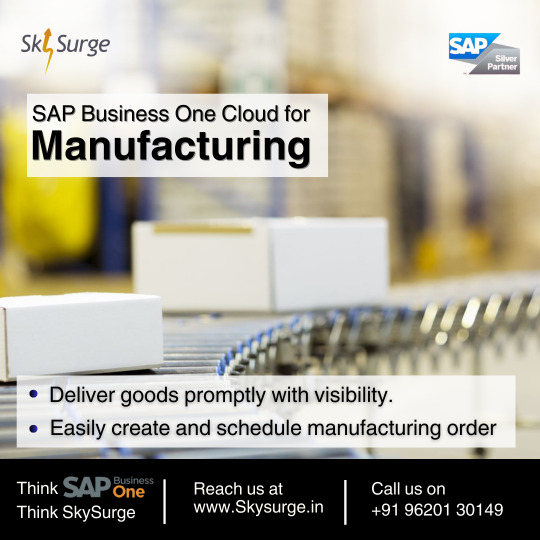
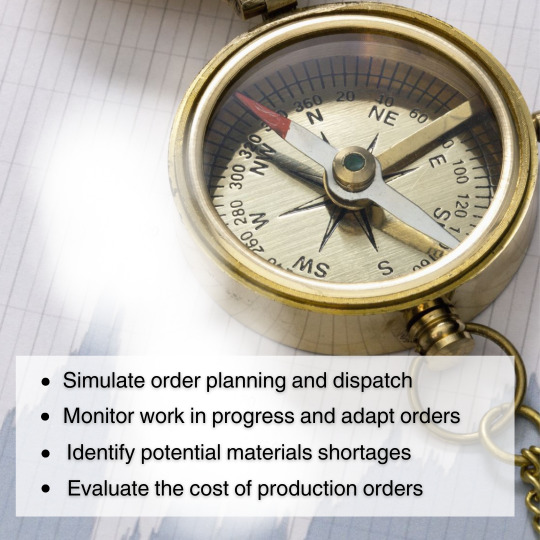
Make manufacturing simple with SAP Business One Cloud! 🌟 Plan and track your work, check for missing materials, and keep everything running smoothly. It's like having a smart helper to make sure you finish on time and save money too
#sap b1#cloud erp#sap erp#clouderp#sap business one#erpsolutions#erp software#erp for small business#sapbusinessone#cloud partner#manufacturing erp#manufacturing industries#manufacturing erp software#manufacturing with netsuite#services#industry#industries#manufacturing supply company#warehouse#development#manufacturing consent
0 notes
Text
Zillancer: Best Manufacturing ERP for Small Businesses
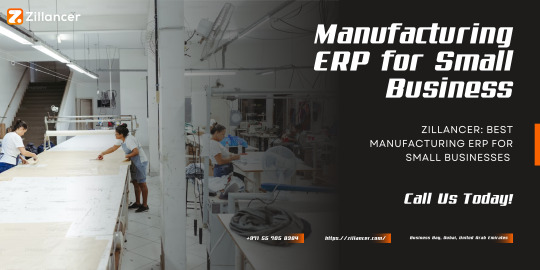
Small businesses in the manufacturing sector can now achieve better efficiency with ERP software solutions. Zillancer connects you with expert freelancers to help integrate customized ERP systems that simplify your processes, boost productivity, and foster growth. Get your manufacturing operations running smoothly with our tailored ERP solutions.
#Best ERP for Manufacturing#Best ERP for Small Manufacturing Business#Best ERP for Manufacturing Industry#Top 10 Manufacturing ERP Systems#Best Cloud ERP for Manufacturing#Manufacturing ERP#Manufacturing ERP for Small Business#Best ERP Systems for Manufacturing#ERP for Manufacturing Industry#ERP System for Small Manufacturing#Top 10 ERP Software for Manufacturing#ERP for Custom Manufacturing#Top ERP for Manufacturing#Cloud Based ERP for Manufacturing#ERP for Manufacturing Companies#ERP Manufacturing Module#ONEERP#Microsoft Dynamics 365#Microsoft Dynamics Business Central
0 notes
Text
#erp#erp software#erp system#erp implementation#erp solutions#cloud erp#erp integration#erpsolutions#erp for manufacturing#erp development company#pharmaceutical manufacturing#erp for pharma#erp for distillery industry#distillery
0 notes
Text
Honeywell and Google Cloud to Accelerate Autonomous Operations with AI Agents for the Industrial Sector
Google Cloud AI to enhance Honeywell’s product offerings and help upskill the industrial workforceNew solutions will connect to enterprise-wide industrial data from Honeywell Forge, a leading IoT platform for industrials October 21, 2024 CHARLOTTE, N.C. and SUNNYVALE, Calif., Oct. 21, 2024 /PRNewswire/ — Honeywell (NASDAQ: HON) and Google Cloud announced a unique collaboration connecting…
1 note
·
View note
Text
#ERP solutions for manufacturing#manufacturing ERP software in Pune#ERP software#ERP software for manufacturing#cloud ERP software for the Manufacturing Industry
0 notes
Text

Cars, Clouds, Cartography
#cartography#map#mountains#space#3D#cars#mass production#industry#nature#soviet#soviet manufacturing#mechanical reproduction#clouds#nimbus#landscape#cloud
1 note
·
View note
Text
Engineer Excellence with STERP: Premier ERP Software Providers in Ahmedabad, India
Elevate your engineering business to new heights with ShantiTechnology - the trusted ERP Software Providers in Ahmedabad. Our cutting-edge solutions are tailored for Engineering Companies in India, empowering your industry-specific needs. Revolutionize your operations and efficiency with the finest ERP Software for the Engineering Industry. ShantiTechnology, your trusted ERP solution providers, offer cutting-edge solutions designed for the unique needs of the engineering industry. Transform the way you manage projects, resources, and finances with ShantiTechnology's ERP software. Our tailored ERP solutions redefine efficiency, transparency, and productivity for the engineering industry.
Choose innovation, choose ShantiTechnology – your dedicated ERP Solution Providers in India.
#ERP Software Providers in Ahmedabad#ERP Software for Engineering Companies#ERP Software for Engineering Companies in India#ERP Software for Engineering Industry#ERP solutions providers in Ahmedabad#ERP India#Supply Chain Management#Go-To-Market#ERP software#technology#India#ERP system#cloud ERP#ERP solutions#software development#manufacturer#engineering#Ahmedabad
6 notes
·
View notes
Text
Maximizing Efficiency with Microsoft Cloud for Manufacturing
In today's fiercely competitive landscape, manufacturers are constantly seeking ways to optimize operations and gain a crucial edge. Microsoft Cloud for Manufacturing emerges as a powerful suite of solutions designed to empower businesses in their journey towards Industry 4.0.
This cloud-based platform integrates seamlessly with existing manufacturing technologies, offering a comprehensive set of tools to streamline processes, boost productivity, and achieve maximized efficiency.
Here's how Microsoft Cloud for Manufacturing can be leveraged to transform your operations:
Enhanced Data Visibility and Analytics: Gain real-time insights into production processes, inventory levels, and equipment performance. By leveraging big data analytics, you can identify bottlenecks, predict equipment failures, and make data-driven decisions for optimized production planning.
Streamlined Collaboration and Communication: Break down information silos and foster seamless collaboration across teams – from design and engineering to production and sales. Cloud-based solutions facilitate real-time information sharing, allowing for faster response times and improved decision-making.
Optimized Resource Management: Microsoft Cloud empowers you to optimize resource allocation, including materials, labor, and equipment. By leveraging digital manufacturing solutions, you can reduce waste and streamline production workflows, leading to significant cost savings.
Improved Quality Control and Traceability: Ensure consistent product quality with advanced quality control tools. Manufacturing technology solutions within the cloud platform enable real-time data collection and analysis, facilitating proactive quality control measures and improved product traceability.
Enhanced Agility and Scalability: The cloud's inherent scalability allows you to adapt to market fluctuations and production demands with ease. Microsoft Cloud for Manufacturing provides the flexibility to scale your operations up or down as needed, ensuring you remain agile and competitive.
By embracing Microsoft Cloud for Manufacturing, you gain access to a powerful suite of tools that empower you to optimize your operations, improve efficiency, and achieve significant cost savings. This comprehensive platform paves the way for a more data-driven, connected, and future-proof manufacturing environment, propelling you towards Industry 4.0 success. Contact Celebal Technologies today!
#manufacturing solutions#industry 4.0 manufacturing#microsoft cloud for manufacturing#manufacturing technology solutions#digital manufacturing solutions
0 notes
Text
0 notes
Text
Unlock the Power of NDI: Revolutionizing AV-over-IP Protocols - Videoguys
New Post has been published on https://thedigitalinsider.com/unlock-the-power-of-ndi-revolutionizing-av-over-ip-protocols-videoguys/
Unlock the Power of NDI: Revolutionizing AV-over-IP Protocols - Videoguys


Experience the transformative capabilities of NDI (Network Device Interface), a groundbreaking technology introduced by NewTek in 2015. NDI has reshaped the landscape of audiovisual connectivity, offering unparalleled simplicity, versatility, and cost-effectiveness to users worldwide. Its open and free-to-use nature has fueled widespread adoption among major AV and IT equipment manufacturers, making it the go-to solution for a myriad of applications.
Delve into NDI’s seamless integration capabilities, which streamline workflows and eliminate the complexities of IP setup. Companies like JVC Professional Video have embraced NDI, leveraging its plug-and-play configuration to establish effortless connections over LAN. This revolutionary approach replaces traditional SDI setups with unprecedented ease, revolutionizing the way content is produced and distributed.
Explore success stories from industry leaders like JVC Professional Video and ENCO Systems, who have seamlessly integrated NDI into their products. By doing so, they have enhanced interoperability and workflow efficiency, setting new standards for audiovisual excellence. From automated captioning to TV-channel-in-a-box solutions, NDI empowers users to achieve unprecedented levels of performance and reliability.
Witness the evolution of NDI, from its early iterations based on the I-frame SpeedHQ codec to the latest variants featuring advanced codecs like H.264 and HEVC. Adapted to support emerging technologies such as 4K streaming and cloud-based workflows, NDI continues to push the boundaries of what’s possible in the world of digital media.
Anticipate the release of NDI 6 and its transformative impact on compact form factors like cameras. With anticipated improvements in integration and image quality, NDI 6 promises to unlock new possibilities for users across diverse industries. As we look ahead to the future of audiovisual connectivity, it’s clear that NDI remains at the forefront of innovation, empowering users to unlock new possibilities in the digital age.
Read the full article by James Careless HERE
Learn more about NDI below:
#4K#applications#approach#Article#box#Cameras#channel#Cloud#Companies#connectivity#content#Digital Media#efficiency#emerging technologies#equipment#Evolution#form#Full#Future#impact#Industries#Industry#Innovation#integration#it#IT equipment#lan#Landscape#Learn#manufacturers
0 notes
Text
Boost Manufacturing Agility with SAP Industry Cloud

Dear Valued Client,
In today's competitive manufacturing environment, agility is paramount. Are your current systems hindering your ability to respond swiftly to market shifts?
SAP Industry Cloud for Manufacturing offers a future-proof solution designed to enhance your operational agility. This innovative cloud-based platform provides:
Improved responsiveness to changing market demands.
Enhanced operational efficiency and cost reduction.
Streamlined integration across the manufacturing value chain.
Adoption of best practices from other industries.
Invest in Your Future:
Learn more about SAP Industry Cloud: [SAP Industry Cloud Solutions for Manufacturing]
Contact KaarTech: Our experienced consultants can help you unlock the full potential of SAP Industry Cloud.
Transform your manufacturing operations and achieve sustainable growth. Contact KaarTech today!
1 note
·
View note